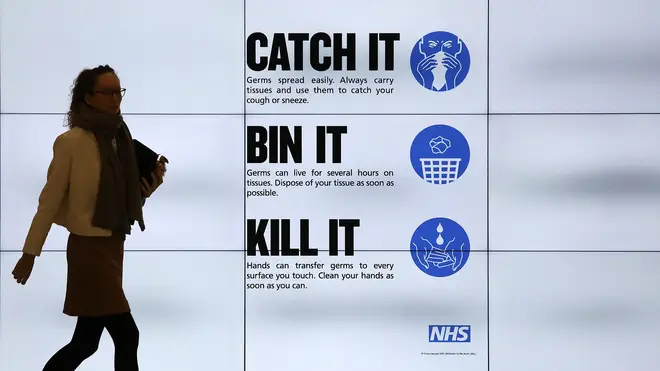
Clive Bull 1am - 4am
31 March 2020, 09:20

As the worldwide coronavirus outbreak deepens a number of myths have sprung up around the spread of Covid-19, LBC News examines some of the disinformation.
MYTH: Coronavirus cannot be spread in hot or humid areas.
From the evidence so far, the Covid-19 virus can be transmitted in all areas, including areas with hot and humid weather. Regardless of climate, adopt protective measures if you live in, or travel to an area reporting Covid-19.
The Government have said the best way to protect yourself against Covid-19 is by frequently washing your hands for 20 seconds or longer.
This means you eliminate viruses that may be on your hands and avoid infection that could occur by then touching your eyes, mouth, and nose.
Read more: How long does Covid-19 live on surfaces? Is post from China safe?
MYTH: Cole weather or snow kills coronavirus.
The World Health Organisation have said there is no reason to believe that cold weather can kill the new coronavirus or other diseases. The normal human body temperature remains around 36.5°C to 37°C, regardless of the external temperature or weather.
Read more: Coronavirus symptoms - What are they and what is the risk of Covid-19 in the UK?
MYTH: Taking a hot bath protects against Covid-19.
Taking a hot bath will not prevent you from catching coronavirus. Your normal body temperature remains around 36.5°C to 37°C, regardless of the temperature of your bath or shower. Actually, taking a hot bath with extremely hot water can be harmful, as it can burn you.
MYTH: The Wuhan coronavirus is spread by mosquito bites.
To date there has been no information nor evidence to suggest that the new coronavirus could be transmitted by mosquitoes.
The new coronavirus is a respiratory virus which spreads primarily through droplets generated when an infected person coughs or sneezes, or through droplets of saliva or discharge from the nose.
Read more: Coronavirus: Beard sanitiser sales spike after NHS urged staff to shave
MYTH: Hand dryers kill coronavirus.
No. Hand dryers are not effective in killing coronavirus protect yourself against the new coronavirus, you should frequently clean your hands with an alcohol-based hand rub or wash them with soap and water. Once your hands are cleaned, you should dry them thoroughly by using paper towels or a warm air dryer.
Read more: Coronavirus UK: Do surgical face masks work to avoid virus symptoms?
MYTH: Ultraviolet lamps kill the infection.
UV lamps should not be used to sterilize hands or other areas of skin as UV radiation can cause skin irritation.
MYTH: Thermal scanners detect all infected people with Covid-19.
Thermal scanners are effective in detecting people who have developed a fever (i.e. have a higher than normal body temperature) because of infection with the new coronavirus.
However, they cannot detect people who are infected but are not yet sick with fever. This is because it takes between 2 and 10 days before people who are infected become sick and develop a fever.
MYTH: Spraying alcohol or chlorine all over your body kills the virus.
No. Spraying alcohol or chlorine all over your body will not kill viruses that have already entered your body. Spraying such substances can be harmful to clothes or mucous membranes (i.e. eyes, mouth).
The WHO has advised people to be aware that both alcohol and chlorine can be useful to disinfect surfaces, but they need to be used under appropriate recommendations.
Read more: Coronavirus: What is a pandemic and how is one declared?
MYTH: Pets spread the virus
At present, there is no evidence that companion animals/pets such as dogs or cats can be infected with the new coronavirus.
However, officials have said it is always a good idea to wash your hands with soap and water after contact with pets. This protects you against various common bacteria such as E.coli and Salmonella that can pass between pets and humans.
Read more: Coronavirus - How will it impact on the world of sports?
MYTH: Antibiotics prevent and treat the new coronavirus?
No, antibiotics do not work against viruses, only bacteria.
The Covid-19 is a virus and, therefore, antibiotics should not be used as a means of prevention or treatment.
However, if you are out in hospital due to coronavirus you may receive antibiotics because bacterial co-infection is possible.